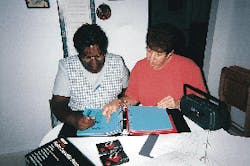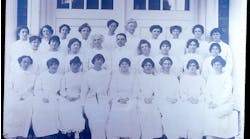Florida transplant shares her homework from hygiene board exams with peers
Cathleen Terhune Alty, RDH
Difficulties in obtaining a license when relocating out of state has been discussed in RDH, as well as other dental journals. One state that keeps popping up as offering a difficult experience is Florida. If it has been 10 years or more since the national board was taken, Florida requires a candidate to retake the national board before being allowed to sit for the Florida state board.
What made this regulation particularly difficult in the past was the lack of study materials a hygienist could find to help prepare for national boards. Jane Weiner, RDH, found herself in such a predicament a few years ago when she moved to Florida.
She, however, turned the problem into a new business venture.
"I had been in practice 17 years when I moved to Florida," Weiner said. "I knew I had to retake the national board, but there was absolutely no information available. I called the dental hygiene schools, and they told me that I would have to go back to dental hygiene school for two years to get the information I needed. I couldn`t believe it! So I took the board cold and I got a 50. This told me that I knew half of the information. I needed to brush up on the half I didn`t remember." So she studied hard and took the board exam again, failing this time by only seven points.
"I was so frustrated because I had no access to the information I needed." She was finally able to get some help from a local community college with a dental hygiene program. "The school allowed me to audit the dental hygiene course for nine months, which required me to do all but clinical. I had to maintain a good average, do projects, etc., at a cost of about $2,000," Weiner said.
Weiner took the national board a third time and passed with an 89. She attended a three-week, soft-tissue curettage course and also attended a review course of the Florida state board. Weiner passed that board exam as well.
Although relieved and pleased with her hard-earned achievement, Weiner felt it was a demeaning experience. "I had practiced 17 years! I knew I went to a good school (Forsythe in Boston), and I still had good hands to practice." Fortunately, she kept of all her board study materials because her adventure really was just beginning.
Weiner`s phone soon began ringing with calls from other hygienists moving to Florida. They desperately were in need of national board study information. They had been referred to Weiner from the dental hygiene department where she had audited their program. They asked her for help in preparing them for their board examination.
"I felt I owed a debt of gratitude to the community college since they helped me get the information I needed. So I took all of my study information and dissected it into sections: jurisprudence, nutrition, anesthetic, pharmacology, periodontics, pathology, dental anatomy, dental materials, etc. I then allowed other hygienists to study from my materials at no charge."
In 1993, though, a dentist called her. He was conducting a state board review seminar for out-of-state dentists relocating to Florida. He was considering adding a review seminar for the dental hygiene state board, and he was interested in having Weiner run that portion of the program for him. The proverbial light came on.
"I realized that I could do this myself!" she exclaimed.
Weiner devoted an entire summer to putting the seminar together. She ordered the most current dental hygiene textbooks and added this information to what she already had. She called the Florida dental board and the national board to see if what she was planning was legal. By the time she had the green light from both organizations, Weiner got a call from a student enrolled at a one-year dental hygiene program at Broward Community College in Florida. A class of 10 people needed board help; could she do anything for them? They were soon meeting every night for two weeks at Jane`s home to review.
"I had some old national board examinations that had been released, so I made new questions from the old board exams. I then gave these new questions to the students." The 10 students passed their exams, and a new business was born.
Weiner was ready to advertise. She contacted the dental hygiene schools to let them know of her review course, but found they weren`t interested in her services. But plenty of dental hygienists were moving into Florida and they needed help. So she pressed on. Soon she received a recommendation from a dental-hygiene temporary service which referred people to her course. A dental supply company and a lab tech company sponsored her courses to help offset expenses. Weiner added a course to review for the Florida state board exam as well as the national board.
"I am not an educator, and I tell the students that up front," says Weiner. "I`m just teaching what worked for me and for others I have trained. It`s not all the material that appears on the board exam, but it does cover the important information the board exam addresses year after year."
Weiner claims to have a near-perfect pass rate from her students. "Out of about 100 review course participants, I would say about three people who have taken the boards did not pass. All of the three were fresh dental hygiene school graduates. All hygienists who were re-entering the field from other states passed."
The board exams are changed a little each year, which means Weiner must continually update her class with the latest information. "The first time I gave the seminar, the course manual was 225 pages. Now it is up to 500 pages and is a two-day seminar." For help, she trained two dentists on board examination material so they could speak to the students on board subjects. She had a dental hygienist join in the teaching of the clinical hygiene portion of the review. Jane also has had hygienists in other parts of the country, who were looking for board review material, take her seminar as a correspondence course.
Shelly DiPaolo, RDH, and her family were transferred to Tampa, Fla., and she also needed to retake the national board so she could take the Florida state dental hygiene board exam. She took Weiner`s course as a correspondence course. "I found it was very thorough," said DiPaolo. "It was easy to study and very in-depth. I am really glad I took it and have been refreshed, especially on the information you don`t use every day."
"The course gives direction and confidence to hygienists," Weiner said. "As long as nationals have to be retaken, there must be some way to get materials to study."
Jane was asked what she thought about Florida`s requirement to retake the board.
"I agree that retaking the board is a protection for patients," she said. "It is sad for people who have been working to have to retake the didactic material. But someone could move here and not be on top of everything, where someone else will be very knowledgeable and up-to-date. One may not be better clinically than the other, but it`s better for the dentist and the patient if we are current. We have to know so much material to be a good hygienist. Having to retake nationals made me a better hygienist for my patients."
Jane Weiner, right, helps Chandra Jaikaran prepare for a board exam.







